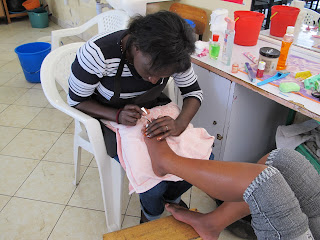 |
| Tailoring instructor Lucy Waithaka |
This is a department that deals with fashions of all kinds from children's wear, men's wear and women's wear and other sewing accessories like bags, table cloths, curtains etc.
Instructor Lucy Waithaka tells: "We therefore train the students with the sewing interest from artisan level to craft level. We train both male and female and of all levels. It is very interesting to now how to stitch with your hands as well as sewing machine. Students find it so interesting to swing the sewing machine and to cut varioius designs of garment items and to stitch them together. Also designs from various fashon magazines and newspapers really motivate and inspire the students to like the whole course."
The course takes two years but one acquires a lot of skills that he/she uses after they are through with school. They also learn how to repair, recycle and re-innovate the old clothes and make use of them of which they can get money after that.
Lucy continues: "It is a course of interest and worth training. Fashion, fashion never ends."
Somebody had donated a huge amount of zippers to the Institute.
If you are more interested in tailoring studies, look at the link:
http://www.ncti.ac.ke/courses/tailoring.html
Francis
is one of the tailoring students who has come to the Institute via Arap Moi Children's home and who has a sponsor in Finland.
Francis is 21 years old and does not know anything about his parents. He has been living the first years in Arap Moi Children's home. Afterwards he got a family where he lived for 12 years, but then in 2008 mama of the family went away and Francis returned to the children's home.
Francis has gone primary school and from January 2011 he has been studying tailoring in the Nakuru Counseling and Training Institute. He says: "The desision about studies was more or less the social worker's. But I think it is good for me. I didn't know where to go, maybe that is my future. I wish to live alone in the city. I hope to get work, maybe visit first in a tailorinfg store."
I asked what kinds of other practical skills, for example cooking skills, he has in order to live totally alone. "I can cook," he answered very surely.
Here in Kenya many tailors work at the street. Francis said that it might be a stress to him. He would prefer working in a salon first and maybe later become an entrepreneur.
Then suddenly he said that playing football is his real talent. But at the moment he does not even have a football, no football shoes, no team, no coach. "Maybe after graduation and starting work I have money to buy these needed things and I get more possibilities to practice."
Tyson
Yesterday I managed to meet Tyson whom I came to know during my last visit here. He was studying tailoring here in the Institute. He also had a Finnish sponsor.
Tyson on the left.
He is now living with his uncle in one of the suburbs of Nakuru. Every morning his walk to work in the center of Nakuru takes an hour and back the same. I visited with him the salon, it really looked good.
Tyson was the one who has really good skills in dancing. He is still dancing in churches, practises with other youths. He is the one who usually does the choreography. Tyson does not go to discos because it would be too unsafe.


















































